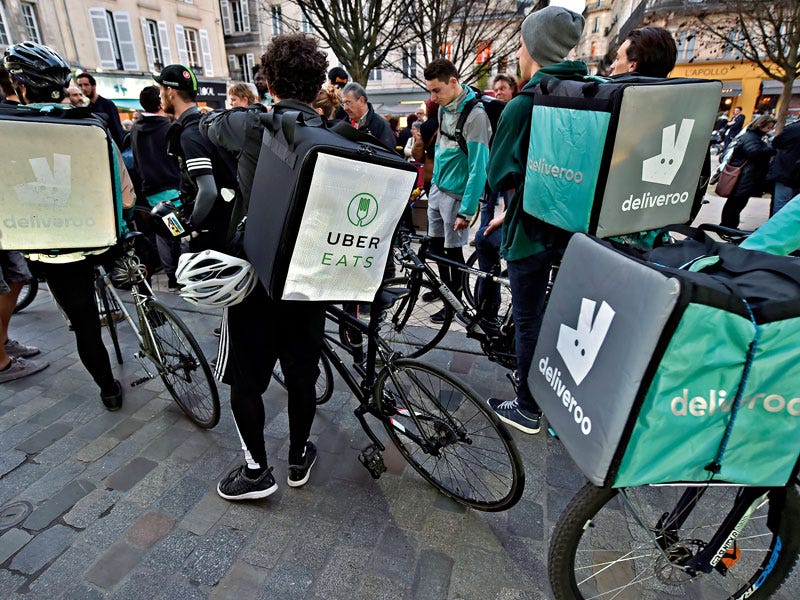Is There Anything as Dispiriting as a Gig-Economy?
There’s this really great opportunity. It’s a ‘zero hours’ contract, so there’s no guarantee of steady earnings, it has no health care or retirement plan and it’s damned hard work unless you have access to an electric bike or scooter. Oh, and I almost forgot, it’s a notch below minimum wage.
Interested?
Probably not, but they’re everywhere, these gig-economy slaves because there finally comes a time when mere survival makes the choice for you.
Mel Stride is the UK Work and Pensions Secretary, a man who should know something about work and pensions
Or maybe not.
“Over-50s looking for work should consider delivering takeaways and other flexible jobs typically occupied by younger people,” Mel said.
Really? Just about the time your hips, knees and lower back are beginning to give way is, in Mel’s plunge into theoretical well-being, a perfect time to shoulder an off balance pack of four dinners and strike off down the already crowded city-center on a bicycle.
Quoted as “taking no lectures from Labour on employment,” it may just be that Stride has next to no experience in manual manliness. Mel’s entire working life consists of inching his way up the political ladder, a choice that may well take a strong grip, but not all that much in the way of body strength. One can hardly picture him peddling off in sweats, dropping off meals for Deliveroo.
But then advice is always easier to give than actually attacking the more physical attributes of an out-of-work working man’s life. Oxford and Cambridge seldom graduate those who might be broke and looking desperately for work in their fifties, and Mel is an Oxford man.
He suggests, “What we’re seeing here is the ability to log on and off any time you like, no requirement to have to do a certain number of hours over a certain period of time, which is driving huge opportunities.”
It’s not a hobby, Mel and ‘what you see’ is a myth of your own making. If you’ve just been made redundant from a $75,000 job and have a mortgage and two kids in university, your ‘huge opportunities’ merely show a politician’s distance from reality.
Amazing to me how those who set the political rules for the poor have seldom walked the walk
Not to be outdone by our British friends, more than one-third of US workers (36%) participate in the gig economy, either through their primary or secondary jobs. This number comprises around 59 million Americans. It's not just multiple job holders; for 29% of US workers, their primary job is actually an alternative work arrangement.
‘Alternative work arrangement’ is corporate-speak for low pay and no benefits
A gig economy is defined as a free market system in which temporary positions are common and organizations hire independent workers for short-term commitments. So now we must define ‘free market,’ lest we overstep the limits of our critique. (Britannica) Free market, an unregulated system of economic exchange, in which taxes, quality controls, quotas, tariffs, and other forms of centralized economic interventions by government either do not exist or are minimal.
And apparently, the powers-that-be in America have bought their way into making this Dickensian circumstance not only legal, but acceptable
This is not as simple as Al Capone running whiskey. Since 1970, the Racketeer Influenced and Corrupt Organizations (RICO) Act has existed as a United States federal law that provides for extended criminal penalties and a civil cause of action for acts performed as part of an ongoing criminal organization.
Okay, so far I understand that. Gotta keep those criminal organizations under control or the public might be at risk. But nearly 60 million Americans are at risk—right now, today, this hour, while you are busy with other things. So, I’m blowing the whistle and naming that criminal organization: Corporate America.
Who else but our corporations, given formerly citizen-only rights by the Supreme Court, could possibly be to blame?
Since Ronnie-the-communicator began his war against unions in 1980, corporations sealed the deal with a $7.25 minimum wage (a number that has not changed in a quarter century), a steady decline in union membership, the off-shoring of middle-class jobs and an ever increasing income disparity that now has 10% of our richest Americans owning 60% of all monetary assets.
Is there a better definition of corporate criminality?
Now, to be historically accurate, the wealthy have always had an outsized influence on our American economy. But it was never systemic. Following the 1929 crash and the Second World War, a vibrant post-war economy and increasing unionization built a solid American middle class, where a single wage-earner was able to sustain a family of four. But seventy million gig-employed Americans now agree that those days are apparently quite over.
The rich wanted more. Then they wanted it all. And they want it now
No fair-minded American can possibly agree that the richest nation in the world should find sixty percent of its workers without benefits, accepting the worst (and most expensive) health care system in the developed world, university costs beyond the reach of what’s left of the middle class and families working so hard at multiple jobs that they never sit down to dinner together.
My years in business were the 50s, 60s and 70s
We cannot and should not attempt to turn back the clock to once again arrive at those times, but we need to turn back the laws. We need to put the tools back in the toolboxes that orchestrated our unique brand of capitalism. Capitalism is a wonderful enabler of dreams, but left without regulation it can be deadly and we have allowed it to be stripped of rules.
Where are the clowns?
Bring in the clowns.
There ought to be clowns.
They’re all riding bikes.

